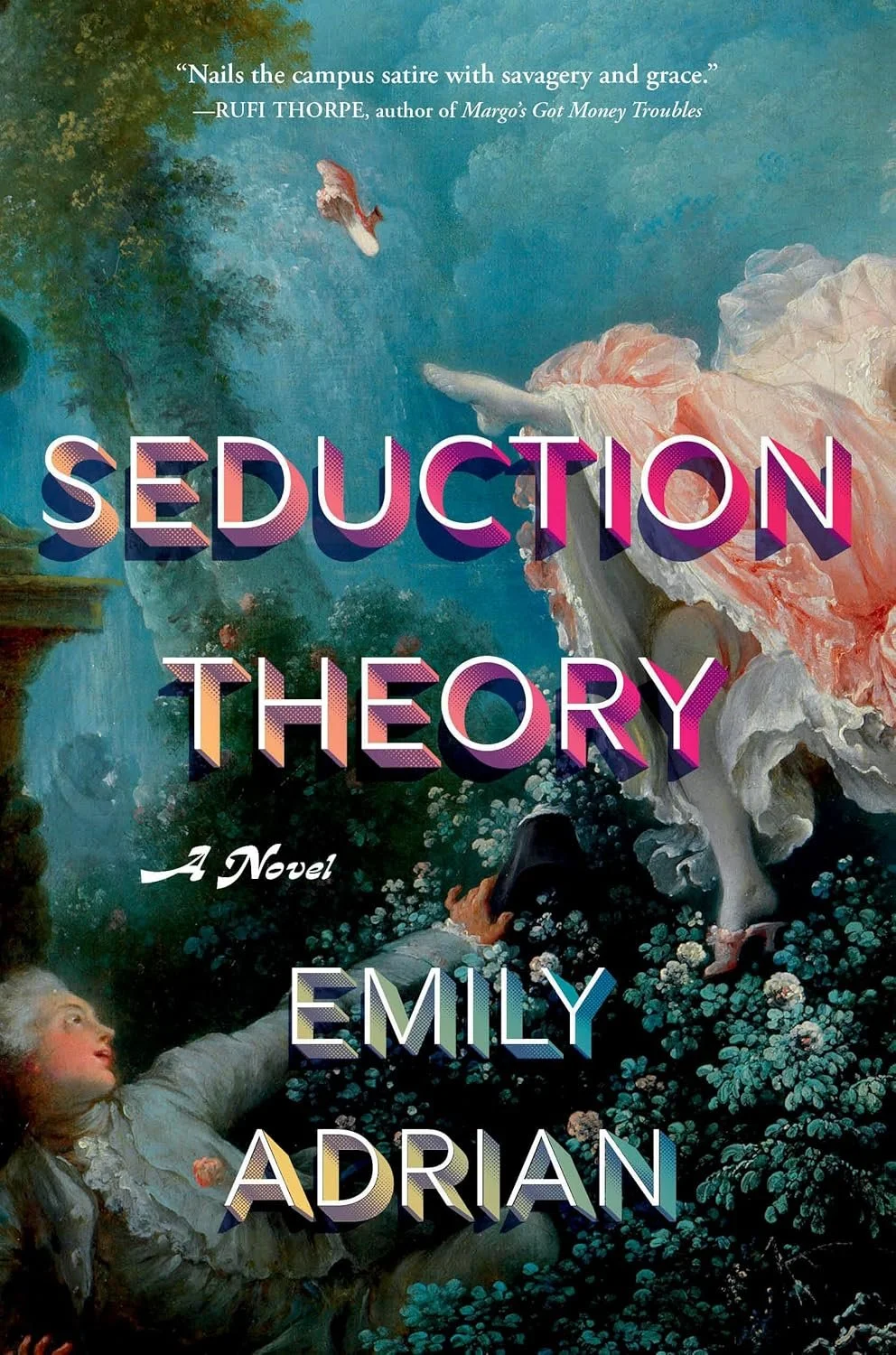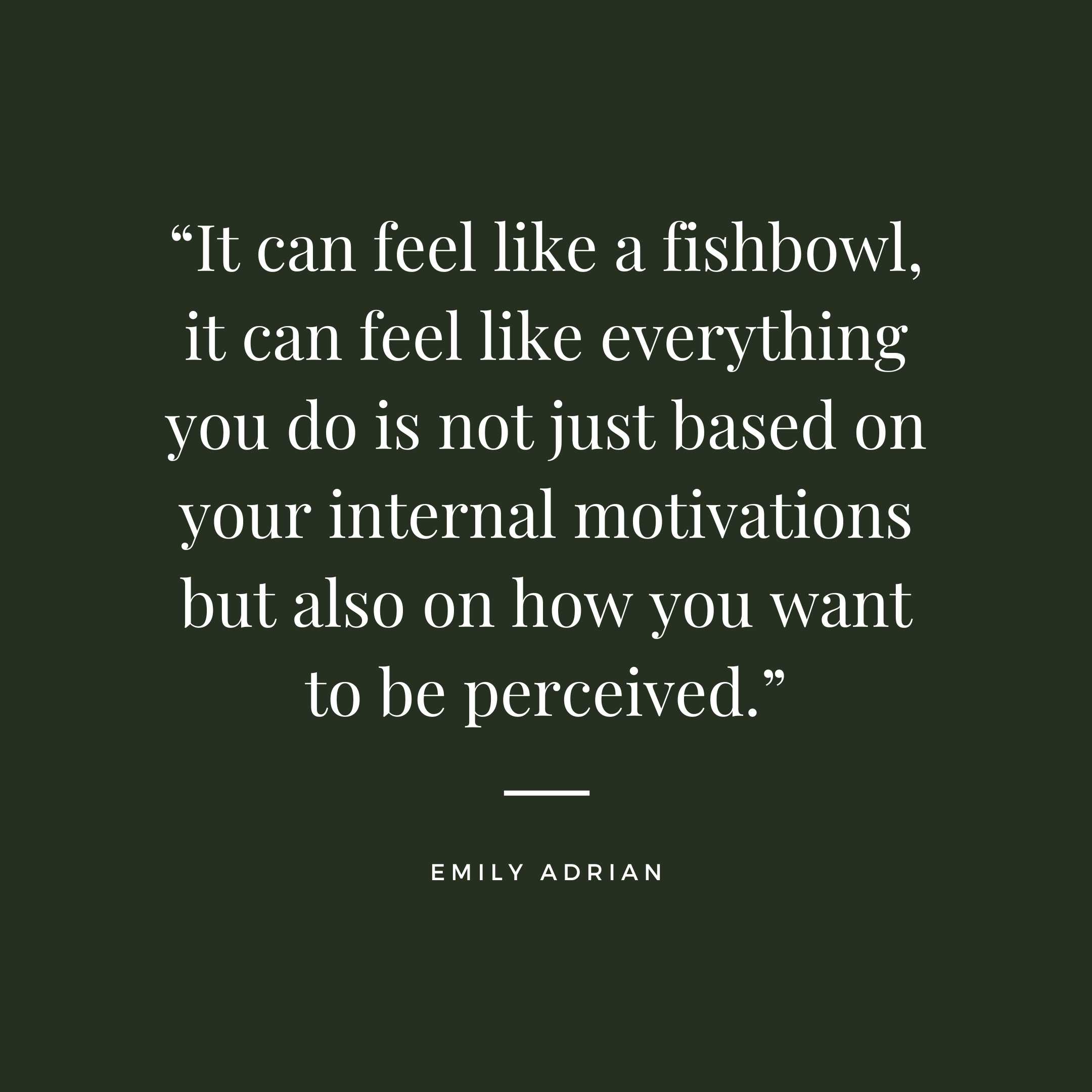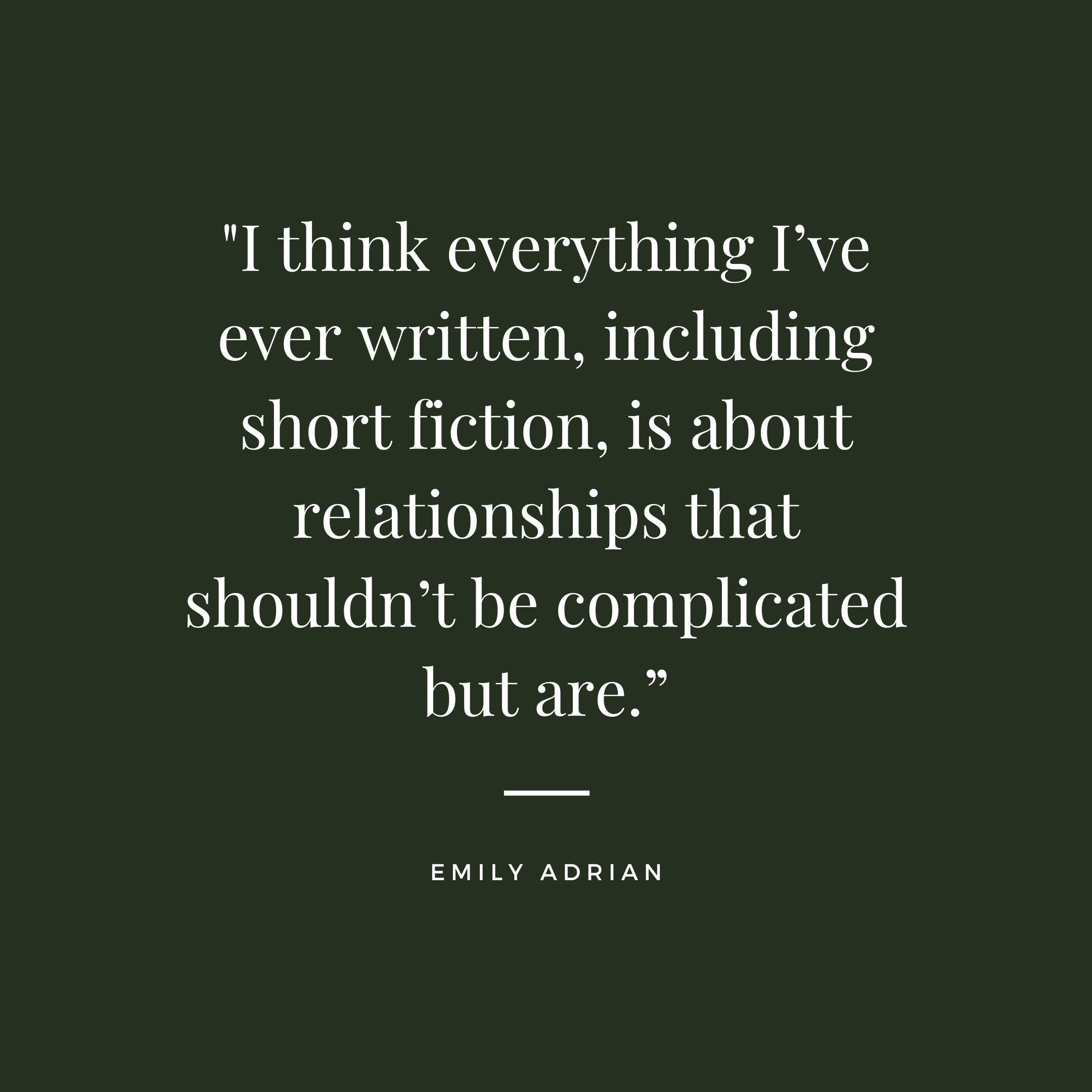Emily Adrian on “Seduction Theory”, Unreliable Narrators, and Exploring the Stakes of Staying Together
In her new novel, Emily Adrian – the author of books such as Everything Here is Under Control, The Second Season, and Daughterhood – explores the parameters of cheating, the stakes of saving a marriage, and the unreliable nature of perspective. Seduction Theory focuses on the marriage between creative writing college professors, Simone and Ethan. While apart for the summer, Ethan sleeps with the department’s administrative assistant, a one night stand that he immediately regrets. Meanwhile, Simone engages in her own type of “affair” with her graduate student, the 23-year-old Roberta “Robbie” Green. While Ethan is away, Simone and Robbie embark on a series of conversations, activities, and even sleepovers – all of which are inappropriate for a professor-student relationship, although they never cross the line of sleeping together.
As if the premise wasn’t intriguing enough on its own, Adrian takes it a step further with the unique structure: the novel that you’re reading is Robbie’s creative writing thesis. Robbie, after learning about the inner-workings of this marriage from Simone herself, has fictionalized the affair saga into a novel. Thus, everything you read is Robbie’s interpretation of what happened, leaving the reader to decipher what’s actually true and just how reliable Robbie is.
In Seduction Theory, Adrian showcases her keen sense for relationship dynamics and a sharp prose, both of which will keep your eyes drawn to the page. The story is utterly fascinating, all-encompassing, and will keep you thinking about how perspective plays into the reliability of any narrator.
Below is our conversation about deciding just how far fictional affairs should go, exploring the stakes of a marriage, what Robbie may have been lying about, and more.
Nikki: How did you know you wanted to be a writer?
Emily: Oh god, I think I always wanted to write fiction from a really young age. I think the desire to do so felt really straightforward to me. When I learned how to read, as a kid, it just made the world make sense to me. Seeing life in terms of narrative came more naturally to me than anything else. So, it morphed into having the compulsion to write and warning to do it for fun long before I had any idea of how to approach it professionally. Then, after college, when everyone’s looking ahead to try to see how they might marry their actual passions with the capacity to make money, that was when I started laying the groundwork for actually having a career.
Nikki: What did that groundwork look like for you?
Emily: I think, because I wanted to be a novelist, the first hurdle was completing a manuscript, [specifically] finishing one that I felt like I could see in print. Then, finding an agent for me was the first step I took professionally. I know some people go to grad school, some people have connections that they might draw on before they start querying agents, but I just started querying cold.
Nikki: How did you come up with the idea for Seduction Theory?
Emily: I was reading all of these recent books about divorce, marriage, monogamy, non-monagamy. And I started to want to write about two people who have been married for a really long time, as a sort of twist on the marriage plot because I think that the question of will two people stay together can be as dramatic and urgent as the question of will two people get together. Especially when you’ve been together for a long time and you’re still in love, there’s a lot at stake. I think a book about two people who still really love each other but have made these horrible mistakes and betrayed each other is a lot more interesting than a book about two people who are no longer interested in each other and are trying to exit a marriage. But I also just didn’t want to write a [straightforward] midcentury marriage novel, I wanted the whole thing to be filtered through this younger, more skeptical perspective, which is where Robbie comes in. She doesn’t really know what marriage is for, she’s not sure who it benefits. She’s younger than Ethan and Simone, so she didn’t grow up with marriage as the gold standard of relationships, but she still finds herself wanting to love someone and be loved by somebody. She’s just not really sure what the framework is for those feelings.
Nikki: Speaking of Robbie, I was so interested in the structure of the novel. It’s structured so that we are reading Robbie’s thesis, as in her fictional account of what happened between the married professors. How did you settle on this structure? Did you ever consider it being more straightforward?
Emily: Only for a second. I think I wrote the first scene – it’s that really claustrophobic department potluck scene, where Ethan is the ostensible protagonist and he’s crammed into a room with all his colleagues and his grad students and he’s trying to figure out if he’s actually attracted to his secretary or if he’s just bored. It made me think about how when we live within a subculture or a community, it can feel like a fishbowl, it can feel like everything you do is not just based on your internal motivations but also on how you want to be perceived. Like, how you want to steer the narrative of your own life, like you’ve been imagining an audience. So that’s where I got the idea to have a stealthy first person narrator who’s kind of lurking in the shadows and we don’t even know who it is at first. Then, that first person voice interjects and you realize, oh, this isn’t about the people in the scene, it’s about who’s watching this scene unfold.
Nikki: Yeah, I found that really fascinating. I’m curious – we’re seeing Robbie’s interpretation of what happened between Simone and Ethan. Do you know what the “true” version of events is? Did you plan that out as part of the writing process?
Emily: That’s a really good question. I don’t have a secret bible of what actually happened. But I did want to plant little clues that Robbie might be lying about some major plot points. There’s this scene where Ethan and Simone are on their post-adultery road trip and they get weirdly distracted by a kid at a pool. And Robbie, as the narrator, spends a scene or two grappling with the question of why Ethan and Simone didn’t have kids. Would that have changed anything? Is that even an interesting question? And, in my mind, it introduces the possibility that, in real life, Ethan and Simone do have kids and Robbie, as a 23-year-old, was not able to wrap her head around what that meant or how that changed the story, so she just takes them out of the equation.
Nikki: That’s so interesting, I hadn't even thought about that as a possibility.
Emily: Yeah, there's stuff like that where I just wanted to not only plant doubt that she’s a reliable narrator – I think it’s obvious that she has unreliable tendencies – but to also hint at what she might be omitting.
Nikki: Yeah, I wanted to ask you about the unreliable narrator aspect. Did you have fun playing around with the unreliable nature of the story? Or what was that like overall?
Emily: It was interesting. One of the most challenging parts of it is that Robbie is inherently more sympathetic to Simone than she is to Ethan because she’s in love with Simone and she resents Ethan for existing. So, to what extent is she motivated as a writer to develop them both equally and show them as equally well rounded people? And to what extent is she trying to make Ethan seem like this hopeless fool and Simone look like the hero? She kind of grapples with that on the page, where she’s like, ‘I don't know if I'm making Simone sound really good and Ethan sound too idiotic.’ And also the fact remains that idiot men marry brilliant women all the time.
Nikki: A big theme of the novel is the ambiguity of what an affair can look like. Simone’s relationship with Robbie is certainly inappropriate for a professor-student relationship, but it’s not a straightforward affair like Ethan’s. How did you settle on just how far their relationship and interactions would go?
Emily: That was the thing that I was fine tuning up until the very final stages of the manuscript. People have different interpretations of it – I had early readers say, ‘Well, Simone doesn’t really do anything wrong’ and other people say, ‘Simone should have been fired 100 pages ago.’ So that was interesting too, that the interpretation of it was so malleable and varied so much. And I really wanted her actions to just really mess with Robbie. I didn’t want them to actually sleep together because that would take the frustration out of it for everybody involved, including the reader. But I also wanted it to be truly beyond the pale – like when Robbie is showering at Simone's house and Simone interrupts it and says, ‘Get out it’s my turn.’ Then, they’re just standing there, staring at each other, naked. That was the last scene I wrote for the book. I was like, there has to be one thing that pushes this graduate student over the edge of her sanity and that was what I came up with.
Nikki: And what about Ethan's affair? Did you ever consider taking it any further?
Emily: I wanted the contrast between the two so-called affairs to be how straightforward and insubstantial one was, versus how confusing and meaningful the other one was. So, he was always just going to have a one night stand with Abigail and what would matter is not the extent to which he betrayed Simone but the concreteness of it. Versus Simone’s relationship with Robbie, where it's really hard to point to the exact moment she crosses a line.
Nikki: This book has so many elements that I just absolutely love – I love a campus novel, I love a marriage novel. What are some of your favorite campus-set novels or marriage novels?
Emily: So, for campus novels, I really like Trust Exercise by Susan Choi, which is a high school campus novel, so a little bit unconventional [because] we’re used to seeing university campus novels. I also really like a novel by Nabokov called Pnin, which is about a bumbling professor of Russian literature whose field is dying, set at a fictionalized Cornell in the 50s or 60s. For marriage novels, I love The Marriage Plot by [Jeffrey] Eugenides. I love Erin Somers’ upcoming book called The Ten Year Affair. I love On Beauty by Zadie Smith, which is actually a campus novel and a marriage novel.
Nikki: How would you say Seduction Theory is in conversation with your other books?
Emily: I think there’s like a sort of irreverence that is front and center in all of my books – narrators who are saying things and admitting to things that may have been wise to keep inside. I think everything I’ve ever written, including short fiction, is about relationships that shouldn’t be complicated but are. Like, we would love it if the relationship between a professor and student was always incredibly straightforward, but connecting with somebody on a level that allows you to really teach them and trusting and respecting a teacher enough to be taught by them, that's a complicated thing that involves a sort of intimacy. So I'm always interested in those relationships that we don’t have easy maps for.
Nikki: What are you working on next? What other themes are you hoping to explore?
Emily: I have only just barely started something new and I don't want to say too much about it yet. But I think it will continue to explore this idea of how much your identity changes in middle age, even though you’ve gotten to a point in your life where people expect you to remain static. When you’ve already made a lot of really big choices, so anything that rocks your world is going to have serious consequences. I will try to write my way through that in a very different setting with very different characters, but that seems to be my recurring theme.
This interview has been edited and condensed for clarity.
Nikki Munoz / Editor
Nikki Munoz is a writer living in Los Angeles. She has written for the LA Times, Looper, Stage Raw, and more. She received her MFA in Creative Writing from Antioch University in Los Angeles and is currently working on a novel.
Find her on Instagram @nikkimunozwrites
Read More







